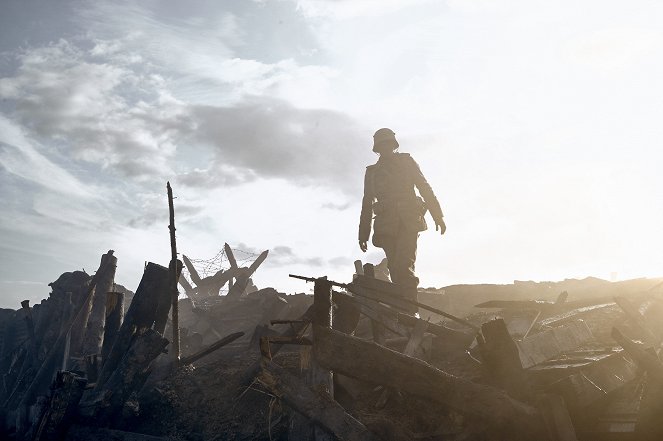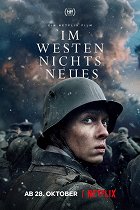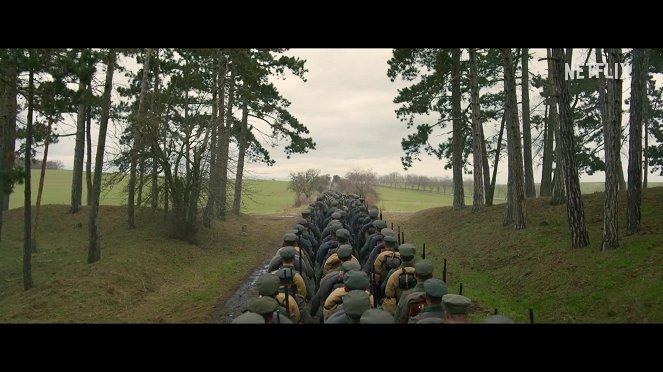Réalisation:
Edward BergerPhotographie:
James FriendMusique:
Volker BertelmannActeurs·trices:
Felix Kammerer, Albrecht Schuch, Moritz Klaus, Aaron Hilmer, Adrian Grünewald, Edin Hasanović, Daniel Brühl, Devid Striesow, Sebastian Hülk (plus)VOD (1)
Résumés(1)
Pendant la Première Guerre mondiale, Paul, 17 ans, rejoint le front de l'Ouest, mais sa ferveur initiale est bientôt foudroyée par la sinistre réalité de la vie dans les tranchées. (Netflix)
Vidéo (5)
Critiques (11)
Je n'ai pas lu l'original, donc j'évalue le film purement en tant que film de guerre. Techniquement il est bien. Il n'y a rien à reprocher à la production, aux costumes, à la caméra ou à l'interprétation des scènes de guerre ou de négociations. Cependant, le portrait des personnages est superficiel et surtout les dialogues ne suivent pas, ils semblent plats et n'ont pas d'impact émotionnel. Le film manque d'une focalisation plus forte sur scénario sur les histoires personnelles du protagoniste et de quelques autres personnages.
()
Quand on parle d'Erich Maria Remarque, je me souviens de ma petite enquête quand j'étais encore au lycée. J'ai demandé à tous les gens que je connaissais quel roman leur venait à l'esprit en premier quand je prononçais le nom de cet auteur allemand. J'attendais une victoire écrasante de À l'Ouest, mais j'avais surestimé mon entourage littéraire car, pour finir, aucun n'a gagné… Personnellement, je préfère d'autres titres de Remarque, mon favori personnel ayant également été adapté au cinéma, mais totalement gâché. Dans le cas de la plus récente adaptation de Im Westen nichts Neues, on ne peut que féliciter les Allemands pour le traitement réussi de l'un des romans antiguerre les plus importants de l'histoire. J'ai lu le roman il y a de nombreuses années, mais j'avais l'impression constante que les créateurs s'en étaient inspirés très librement. Et j'en suis en fait convaincu, ne fût-ce que par rapport à la fin du film, autrement Après n'aurait pas pu exister. Je suis également sûr que le livre n'était pas aussi explicite que le film, mais ça ne me dérange pas du tout, cela souligne au moins l'absurdité et l'inutilité de toute la guerre. Felix Kammerer et ce cher Daniel Bruhl dans un rôle secondaire ont fait des prouesses. Quant à la BO, elle mérite un Oscar. Les créateurs pourraient d'ailleurs s'attaquer à Trois camarades…
()
The repetitive alternation of the heat of battle and the coldness of waiting, the recurring motifs for unimaginative half-wits, the book’s premise stripped of all its compelling scenes, which the film replaces with simple (and sometimes unrealistic) war porn and a completely hollow political storyline. The film fails to approximate Remarque’s insistent humanism except by literally illustrating the conflict of minor and major history, which doesn’t make a lot of sense (the horrors of the First World War didn’t actually consist in the fact that Foch wanted an armistice in six days and the Germans needed to think it over). As an adaptation, this is a disaster, devoid of psychology and with no thoroughly developed characters, and as a film it’s drawn out, transparent and superficial. The versions from 1930 and 1979 had something to them, but this fails even as a stand-alone work. Netflix’s problem isn’t the lack of casting actors of color. Its problem is that its projects lack dramaturgy and thus don’t much sense.
()
Clear winner of this year's war films, and for me better than 1917 and Dunkirk (Hacksaw Ridge is a little higher in my heart though). I haven't read the book, nor have I seen the original, I just know that it's an adaptation of a literary classic by Remarque and I think the film stood up to it on all counts. From the very beginning the film thrusts us into the action of the war itself, which I very much appreciate – thankfully there is no hour-long introduction to the characters before the war, everything happens on the fly and thanks to that the film also has a decent pace and never gets boring. Edward Berger has his craft down pat, technically it's a decent work, with epic music that adds to the atmosphere and tension. The characters didn't really grow on me, except for the main one, so emotionally it didn't hit me that much, although it is sad in places. I found it interesting to watch a war film from the perspective of the Germans, usually it's the other way around, so the film is definitely unusual in that way too. I enjoyed the scenes with the General screaming for himself (the final speech was great) and the armistice negotiations on the train were also interesting. There's not a lot of action scenes, though, there are only three epic battles, but since the film is set in a battlefield most of the time, I didn't mind. The highlight is the sequence in the middle where the tanks and flamethrowers come on the scene – you can feel the true despair and horror of war, really uncomfortable. As for the gore, there's not much of it either, but there are a couple of brutal shots (the tank running over probably sticks in the mind the most), so for me really big satisfaction and I would say it’s the best WW1 war film. Definitely an Oscar snatcher here and kudos to Netflix. 8.5/10.
()
An adaptation that isn't afraid to mess with the very foundations of what is rightly a timeless classic and yet it is the most faithful adaptation possible. An established benchmark of how to adapt the written word into film language (not telling and showing), preserving the message and yet "standing up and not being a mere illustration". Everything is subordinated to the suggestive concept of "you are there with them". The absurdity and futility of the war machine through everyday trench existential horror, which, however, in addition to the horrific scenes (through a war scene, through the simple survival without hope for the future), manages to contrast the humanity and unexpected permeations of normality in spite of everything (officers, timelessness, humanity), often without words; purely by sight, sound, suggestion, music. Yes, you could say that it doesn't build up, it just kind of flows during the last days on the front. That’s not very viewer friendly, but it’s the intention, and it works, without being the same over and over again. It cannot be denied that many of the horrors have already been handled equally impressively by other works (but it is hard to accuse the adaptation of the classic on which everyone is based of being "a bit dated"). This is a film that will inevitably divide, some will berate it because "they messed with my beloved book", others because "we've seen this before and we don't need to do it again", others will bemoan "the non-existent pace". And then there'll be those who won't sleep easy as a result, not because of the explicit depictions of wartime atrocities or the topicality "it was a century ago", but for the overall sense of the confusion of it all, even though it makes do with little; perhaps the mere pilgrimage of a uniform from the front.
()
Photos (35)
Photo © Netflix / Reiner Bajo



Annonces